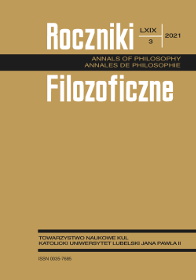How to Be a Christian Ultimist? On Three Lessons J. L. Schellenberg and the Christian Theist Can Learn from Each Other
Abstrakt
Jak być chrześcijańskim ultymistą? O trzech lekcjach, których mogą sobie wzajemnie udzielić j. L. Schellenberg i chrześcijański teista
W niniejszym tekście – dyskutując z J. L. Schellenbergiem – rozwijam stanowisko, które nazywam chrześcijańskim ultymizmem. Stanowisko to znajduje się pomiędzy prostym ultymizmem Schellenberga a tradycyjnym chrześcijańskim teizmem. Chrześcijański ultymizm jest bardziej apofatyczny niż personalistyczny, choć wyraźniej akcentuje występowanie w Ostatecznej Rzeczywistości elementu ponad-osobowego i komunikacyjnego. Proponowane stanowisko jest oporne na filozoficzną wersję argumentu ze skrytości, ale musi się zmierzyć z teologicznym problemem braku powszechnego dostępu do chrześcijańskiego objawienia. Schellenbergowska idea głębokiego czasu nasila ten problem, ale również dostarcza narzędzi do jego rozwiązania: świadomość głębokiego czasu nie pozwala nam wyrokować o przyszłości, ale pozwala mieć nadzieję na objawienie dostępne dla wszystkich w eschatologicznym końcu czasu.
Bibliografia
Aquinas, Thomas. Summa Theologiae. https://www.corpusthomisticum.org/sth1003.html.
Aquinas, Thomas. De potentia. https://www.corpusthomisticum.org/qdp7.html.
Davis, Stephen T. 2009. “Revelation and Inspiration.” In The Oxford Handbook of Philosophical Theology, edited by Thomas P. Flint and Michael C. Rea, 30‒53. Oxford: Oxford University Press.
Green, Adam, and Eleonore Stump, eds. 2018. Hidden Divinity and Religious Belief: New Perspectives. Cambridge: Cambridge University Press. First published 2015.
Howard-Snyder, Daniel. 2018. “Divine Openness and Creaturely Nonresistant Nonbelief.” In Green and Stump, Hidden Divinity and Religious Belief, 126–38.
Howard-Snyder, Daniel and Paul K. Moser. 2002. “Introduction: The Hiddenness of God.” In Divine Hiddenness: New Essays, edited by Daniel Howard-Snyder and Paul K. Moser, 1–23. Cambridge: Cambridge University Press.
Moser, Paul K. 2002. “Cognitive Idolatry and Divine Hiding.” In Divine Hiddenness: New Essays, edited by Daniel Howard-Snyder and Paul K. Moser, 120–48. Cambridge: Cambridge University Press.
Pouivet, Roger. 2018. “Against Theistic Personalism: What Modern Epistemology Does to Classical Theism.” European Journal for Philosophy of Religion 10 (1): 1–19.
Rea, Michael C. 2018. The Hiddenness of God. Oxford: Oxford University Press.
Schellenberg, John L. 2009. The Will to Imagine: A Justification of Skeptical Religion. Ithaca, NY: Cornell University Press.
Schellenberg, J. L. 2017. The Hiddenness Argument: Philosophy’s New Challenge to Belief in God. Oxford: Oxford University Press. First published 2015.
Schellenberg, John L. 2018. “Divine Hiddenness and Human Philosophy.” In Green and Stump, Hidden Divinity and Religious Belief, 13–32.
Trakakis, Nick N. 2018. “The Hidden Divinity and What It Reveals.” In Green and Stump, Hidden Divinity and Religious Belief, 192–209.
White, Thomas J. 2016. Wisdom in the Face of Modernity: A Study in Thomistic Natural Theology. Ave Maria: Sapientia Press of Ave Maria University.
Wojtysiak, Jacek. 2019. “Religious Diversity and Rational Choice of Religion.” Философия религии:аналитические исследования/Philosophy of Religion: Analytic Researches 3 (2): 76–86. https://doi.org/10.21146/2587-683X-2019-3-2-76-86.
Copyright (c) 2021 Roczniki Filozoficzne

Utwór dostępny jest na licencji Creative Commons Uznanie autorstwa – Użycie niekomercyjne – Bez utworów zależnych 4.0 Międzynarodowe.





